Beneath the Planet of the Apes (1970)
Directed by: Ted Post
Written by: Mort Abrahams, Paul Dehn
Starring: James Franciscus, Kim Hunter, Linda Harrison, Maurice Evans
USA
AVAILABLE ON BLU-RAY, DVD AND DIGITAL
RUNNING TIME: 95 mins
REVIEWED BY: Dr Lenera
MAJOR SPOILERS!
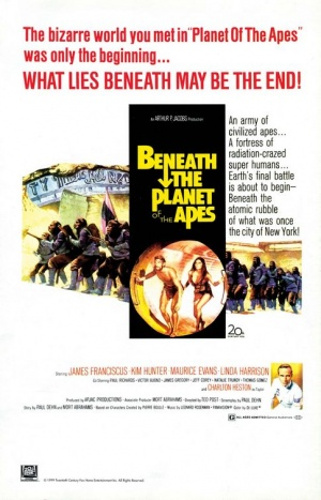
Time-displaced astronaut George Taylor and the mute Nova are in search of a new life far away from Ape City when George disappears before Nova’s eyes amidst mysterious fires and earthquakes. Meanwhile a team led by John Brent is sent to locate George and crash lands on the same future earth, though sole survivor George thinks it’s an alien planet even when he encounters Nova. In Ape City, the gorilla General Ursus plans to conquer the Forbidden Zone, kill all its human inhabitants, and use it as a potential food source, against the objections of the orangutan Dr. Zaius. Brent and Nova escape to the ruins of New York City, beneath which live a race of telepathic humans even more dangerous than the apes….
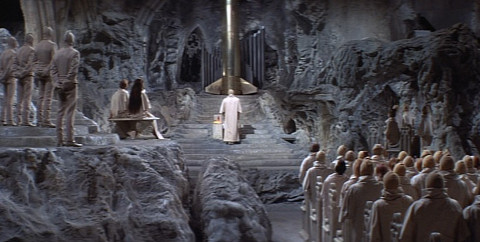
They used to show these films a lot on TV when I was young; if my memory serves me correctly Planet Of The Apes and Beneath The Planet Of The Apes was shown by the BBC while ITV had Escape From The Planet Of The Apes, Conquest Of The Planet Of The Apes [though they didn’t show that one too often, probably because it was the most violent and overtly political] and Battle For The Planet Of The Apes. This first sequel was my firm favourite for quite a long time; it had the most action, slight elements of horror [even though the TV version was cut] and an ending that was totally gobsmacking in its nihilism, and was thought up by Charlton Heston no less, so that there wouldn’t be any more sequels [he didn’t like sequels]. I just loved it. The previous film revealed that this planet was actually Earth; this one had the whole flipping planet be destroyed. It’s only matched by the much smaller scale but just as upsetting ending of Soylent Green, which also starred Heston. It’s incredible that the film was still a sizeable hit, but maybe studios and audiences were braver then? Seen now with older and more critical eyes, it’s a tad messy, and unfortunately the lower budget does show, especially in the rather restricted, cramped nature of the proceedings in comparison with the expansive feel we’d seen before. However, it still succeeds pretty well as a sequel; it doesn’t simply replicate the first film nor delve into wholly new territory which may have segregated it from the original, but achieves a nice balancing act by doing a bit of both. The pace really does move with this one even if one can also say that there’s slightly less room for nuance this time around. And I do like its lack of knowing humour which I felt went a little overboard in the original.
Planet Of The Apes‘s original screenwriter Rod Serling was consulted about a sequel, but his ideas didn’t interest 20th Century Fox. Author of the original novel, Pierre Boulle, wrote a draft for Planet of the Men, where George led an uprising of the enslaved humans to take back control from the apes, but it was rejected as it lacked the “visual shock and the surprise” of the original. Associate producer Mort Abrahams then wrote story elements, and Paul Dehn was hired to develop them into what was then called Planet of the Apes Revisited, though the idea of a half-human, half-ape child was dropped due to the implication of bestiality. Heston had little interest in returning, but eventually agreed to briefly appear with the provision that George be killed and that his pay go to charity. His role became minimal and rewriting was done to created a new protagonist for most of the story, who was almost played by Burt Reynolds. Director Franklin J. Schaffner was also invited to return but was busy with Patton. Ted Post agreed to do it if there were some changes and ended up making them himself with star James Franciscus. Roddy McDowall was unavailable to return as Cornelius and Orson Welles turned down the role of General Ursus because his face would never be seen. Due to Fox having had several recent flops, the budget was cut, though sources vary as to how much [Post has said it was halved] and sets from Hello Dolly were reused. While getting a baffling ‘G’ [aka ‘U’] rating in the USA, it lost over a minute of footage in the UK so it could get an ‘A’ [aka ‘PG’] certificate. Both scenes where John is forced to attack Nova, the revelation of the underground humans’ true appearance, and some action scenes were reduced. This was the version that showed on UK TV for ages. It was almost as commercially successful as the original despite harsher reviews.
Up till about half way through, what we have is a variant on what came before, but I disagree with those reviewers who say it just repeats it; for me, there are enough variation so that we don’t get a total case of deja vu. And if we have another astronaut looking for George, then we have to have some similarities as he explores to this new planet, finds out it’s ruled by talking intelligent apes etc. As with a few other ‘second’ films, this one reminds us of the first one’s ending and then follows directly on from it. You could put the two films together to watch as one really long movie, and it would work if you ignored the differences between the two films in terms of look, budget etc. We cut from George and Nova riding to another crashed spaceship and the remaining survivor besides John dying in a rather moving moment considering he’s a person we’ve only just met. “My wife, my two daughters, every one I never thought I knew, everyone….” he utters before he dies. John hears the sound of a horse and it’s Nova, minus John. What happened to John is told in flashback and a scene with a really ominous feel that lets us know that this film will be darker than the one – as well as cheaper. Fire shoots up from the ground, but the fire is virtually see-through and a matte painting is highly obvious; the first film had matte paintings but they were so good that even on High Definition it’s hard to see the seams. Chasms also appear and George disappears in front of a cliff wall in an almost surreal moment. Nova takes John to see Zira which is what George told her to do, and they get into Ape City and find Zira and Cornelius absurdly easily. David Watson is fine as Cornelius and does sound like Roddy McDowall, but he doesn’t have the chemistry with Kim Hunter as Zira that McDowall had. It’s also a shame though that Zira and Cornelius disappear two fifths of the way through.
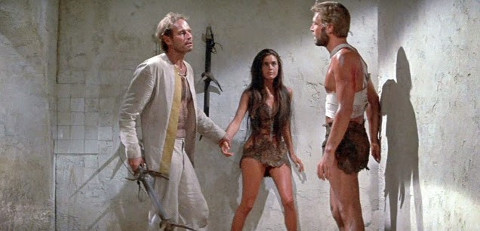
Ursus’s reason for this military trip to the Forbidden Zone makes sense; the apes need new vegetation because there’s a famine and us humans caused so much damage with our weapons that much of the land is infertile. Zaius also comes along, though his reason is different; he thinks it’s better that apes continue to live in innocence – or should that be ignorance? As before, things are often not black and white, and I don’t think that this sequel is the highly simplistic piece many claim it to be. John and Nova are captured after a horseback chase to be used as target practice but escape with Zira’s help. There’s a good bit where they pass a gorilla training camp where humans are used as props. They hide in the ruins of New York where we get quite a strong piece of acting from Franciscus where John realises what humans did and thinks that it would have been best if they’d remained primitive. While he never really broke out as a star, I’ve always liked Franciscus; he was an amiable lead in The Valley Of Gwangi and The Cat O’ Nine Tails and his role here requires him to display some emotion as well as nastiness. He does both admirably. The two find a race of mutant humans who worship not just a nuclear weapon but a doomsday device. I wonder if Dehn was inspired by The Time Machine with its Eloi and Morlocks, humanity having become two subspecies, one living peacefully on the surface and one living underground which controls and preys on the other? These mutants don’t kill but use telepathy to make their enemies kill each other and can conjure up hallucinations to terrify them too. They provide some creepy and even very blackly comic moments like a weird parodic church service, though I don’t think that their culture is explored enough, we don’t get enough of a sense of their world like we did of the apes.
Still, we get a lot of violence including a fair bit of blood [how the hell did this get a ‘G’ for ‘General audiences’ certificate in the States?] and even some genuine intensity as George is sometimes turned bad and even gets to fight John in a good, brutal brawl. One mutant is impaled on spikes and the moment is really lingered on. It seems like things are heating up for a big battle between apes and mutants, but after a good start it kind of winds up rather quickly. Oh well, nearly everyone is killed off and then John blows up the planet. It’s rather appropriate that the credits have no music so audiences could better take in what’s just happened. The irony of the ending relates to Planet Of The Apes’s conclusion. There, George condemned the human race for destroying their world with nuclear weapons. Here, he basically re-enacts the very same atrocity. He blows up the Earth with a nuclear weapon in what is a bitter but sadly true comment on human nature; it doesn’t change! George’s arc is devastatingly sad. He was totally alienated from humanity and never found love. He eventually found it on this future earth. She’s killed, he can’t bear to go on living, and is therefore willing to destroy the world that killed her. Love, it seems, is indeed worth living for, but its destruction is ultimately world-destroying. It’s just as well this is so compelling, because John is largely ineffectual and contributes little. You can tell that they created his character when Heston said he didn’t want a lot of screen time. Commentary of a more topical, on the nose feel appears when we see ape youths protesting about the warmongering of Ursus’s lot as if they were invading Vietnam. It sticks out, but then the fourth film in this series was like this throughout so one should maybe prefer to see it as a forerunner to the most overtly political film in the series.
Zira and Cornelius get a strange moment where Zira pretends she’s been hit by Cornelius to give Zaius an excuse for the blood from the wounded John that’s on her face, and Zaius doesn’t seem to think it’s particularly bad. One shouldn’t make a big deal out of it but it’s odd. The smaller funds given to this enterprise do show when you see it soon after the first one. The budget probably required that the second half adopt a slightly claustrophobic feel, aided by Post using far fewer wide angles than his forebearer Schaffner, but there clearly still wasn’t enough to make all the underground settings convincing, while it’s noticeable how simple and immobile many of the ape masks in the background are. However, all this was Fox’s fault, cast and crew generally doing their best. I used to rather dislike Leonard Rosenman’s music score, which is even more experimental than Jerry Goldsmith’s stunning work and has no real musical hooks except for his chaotic march for the ape army, consisting largely of vertically stacked layers of sound. But with more mature ears it’s an interesting bridge between the alien soundscapes Rosenman created for Fantastic Voyage and the percussive barbarism of Goldsmith’s evocation of the upside-down civilization of the ape planet. I stand by my argument that this one is generally underrated. It expands the universe while delivering plenty of what was good about Planet Of The Apes. It has a slightly different tone – darker, more sinister – while still delivering an exciting, lively science fiction adventure for both adults and [okay it’s a bit vicious but most of today’s ten year olds will have seen worse] kids. It’s not lacking in heart – even if this heart is a cruel, nihilistic one which tells us that things are so bad that maybe the only way to sort things out is to destroy everything – which peculiarly might be partially supporting nuclear weaponry. Beneath The Planet Of The Apes is more complex than it looks.
Rating: 











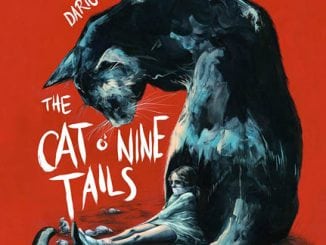
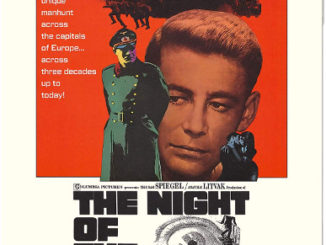
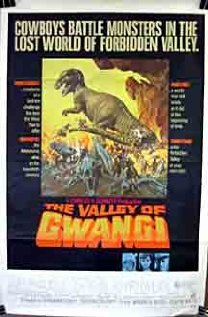
Be the first to comment